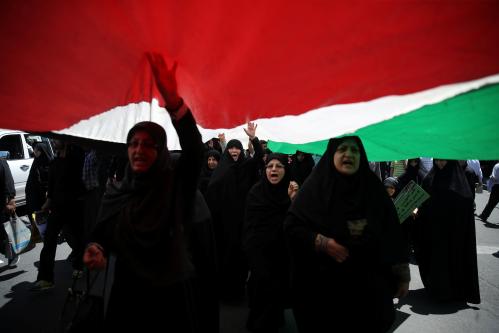Iran is facing an intersecting set of internal and external crises, and the regime’s options for extricating itself in the face of new threats from the Trump administration are both risky and unlikely to offer a quick fix. Iranian leaders understand how to play the long game, writes Suzanne Maloney. This piece originally appeared in The Atlantic.
Just hours after Secretary of State Mike Pompeo delivered an address billed as a show of friendship to the Iranian people, President Donald Trump offered up a late-night chaser: an all-caps tweet warning that any Iranian threats would precipitate “CONSEQUENCES THE LIKES OF WHICH FEW THROUGHOUT HISTORY HAVE EVER SUFFERED BEFORE.”
To Iranian President Rouhani: NEVER, EVER THREATEN THE UNITED STATES AGAIN OR YOU WILL SUFFER CONSEQUENCES THE LIKES OF WHICH FEW THROUGHOUT HISTORY HAVE EVER SUFFERED BEFORE. WE ARE NO LONGER A COUNTRY THAT WILL STAND FOR YOUR DEMENTED WORDS OF VIOLENCE & DEATH. BE CAUTIOUS!
— Donald J. Trump (@realDonaldTrump) July 23, 2018
Tehran’s response came hours later, in the form of a tweet penned by Mohammad Javad Zarif, the Islamic Republic’s foreign minister and its most effective purveyor of diplomatic blandishments aimed at Western audiences. “COLOR US UNIMPRESSED,” Zarif observed archly. After asserting Iran’s national longevity and superiority, he echoed Trump’s closing words: “BE CAREFUL.” Senior national-security officials in Tehran fired back more pointedly, emphasizing Iran’s retaliatory capabilities while also appearing to deride Trump’s disruptive approach to foreign policy. Still, for a leadership that has trademarked the art of anti-American invective, the reaction seems oddly subdued.
That’s no accident. The Islamic Republic is facing an intersecting set of internal and external crises, and the regime’s options for extricating itself are both risky and unlikely to offer a quick fix. After weathering a number of past existential crises, ranging from Saddam Hussein’s 1980 invasion to the massive protests that erupted in 2009, Iranian leaders understand how to play the long game. Tehran’s response to Trump’s tweet is consistent with how its leaders have dealt with his previous confrontational gambits over the past 18 months, including his decision in May to pull the United States out of the 2015 nuclear deal. Iran’s leaders sense that the Trump administration is trying to goad them into self-immolation, and for once they are taking pains to avoid taking the bait. Unfortunately, that probably won’t last.
Since taking office, Trump has articulated a tough stance on Iran, repeatedly criticizing the “horrible” nuclear deal and depicting the country as the wellspring of the radicalism and violence that has wracked the Middle East and precipitated American interventions. And although Trump’s national-security staff has experienced unprecedented turnover, senior administration officials have shared at least one common trait: a determination to turn up the heat on Iran.
The White House’s fixation on Iran culminated with Trump’s announcement two months ago to walk away from the nuclear agreement and begin re-imposing the severe financial and trade sanctions that had been suspended in accordance with the deal. Despite vehement opposition from much of the rest of the world, including the other parties to the nuclear deal, the U.S. measures are already casting a dark shadow by effectively forcing firms and banks around the world to choose between the Iranian and the American markets. U.S. officials have already announced that they will try to cut off all Iranian oil exports by November.
All of this is playing out at a particularly precarious moment in Iran, brought about largely by its sluggish recovery from a generation of economic mismanagement and the devastating toll of the sanctions that helped bring about the nuclear deal. Public expressions of dissatisfaction with the ruling system have grown increasingly bold and volatile, and given the age of Ayatollah Ali Khamenei, the country’s supreme leader, jockeying for a crucial leadership succession process has already begun in earnest.
From the vantage of Iran’s theocrats, the Trump administration’s efforts to squeeze its economy has little to do with any legitimate concern about its nuclear ambitions, its interventions across the Arab world, or its mistreatment of its own people. Rather, the campaign represents a predictable new iteration of the perennial American effort to destabilize the post-revolutionary state and oust its leadership. Islamic Revolutionary Guards Corps (IRGC) Major General Mohammad Hossein Bagheri warned that the economic offensive is only a prelude to the real goal of the White House: a military attack.
The Brookings Institution is committed to quality, independence, and impact.
We are supported by a diverse array of funders. In line with our values and policies, each Brookings publication represents the sole views of its author(s).






Commentary
Iran isn’t taking Trump’s Twitter bait—for now
July 26, 2018